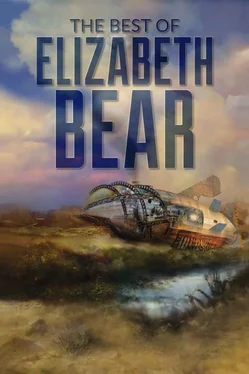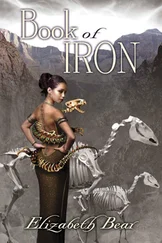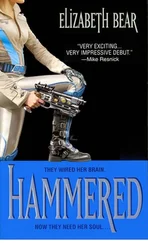“You said that was for Sir Kay.” He lifted the chain in his hands and studied the way the glass and stones caught the light.
“It’s for somebody to remember her,” Chalcedony said. She didn’t correct him this time. She picked up the other forty necklaces. They were heavy, all together. She wondered if Belvedere could carry them all. “So remember her. Can you remember which one is whose?”
One at a time, he named them, and one at a time she handed them to him. Rogers, and Rodale, and van Metier, and Percy. He spread a second blanket out—and where had he gotten a second blanket? Maybe the same place he’d gotten the dog—and laid them side by side on the navy blue wool.
They sparkled.
“Tell me the story about Rodale,” she said, brushing her grab across the necklace. He did, sort of, with half of Roland-and-Oliver mixed in. It was a pretty good story anyway, the way he told it. Inasmuch as she was a fit judge.
“Take the necklaces,” she said. “Take them. They’re mourning jewelry. Give them to people and tell them the stories. They should go to people who will remember and honor the dead.”
“Where’d I find alla these people?” he asked, sullenly, crossing his arms. “Ain’t on the beach.”
“No,” she said, “they are not. You’ll have to go look for them.”
But hewouldn’t leave her. He and the dog ranged up and down the beach as the weather chilled. Her sleeps grew longer, deeper, the low angle of the sun not enough to awaken her except at noon. The storms came, and because the table rock broke the spray, the salt water stiffened her joints but did not—yet—corrode her processor. She no longer moved and rarely spoke even in daylight, and Belvedere and the young dog used her carapace and the rock for shelter, the smoke of his fires blackening her belly.
She was hoarding energy.
By mid-November, she had enough, and she waited and spoke to Belvedere when he returned with the young dog from his rambling. “You must go,” she said, and when he opened his mouth to protest, she added “It is time you went on errantry.”
His hand went to Patterson’s necklace, which he wore looped twice around his neck, under his ragged coat. He had given her back the others, but that one she had made a gift of. “Errantry?”
Creaking, powdered corrosion grating from her joints, she lifted the necklaces off her head. “You must find the people to whom these belong.”
He deflected her words with a jerk of his hand. “They’s all dead.”
“The warriors are dead,” she said. “But the stories aren’t. Why did you save the young dog?”
He licked his lips, and touched Patterson’s necklace again. “’Cause you saved me. And you told me the stories. About good fighters and bad fighters. And so, see, Percy woulda saved the dog, right? And so would Hazel-rah.”
Emma Percy, Chalcedony was reasonably sure, would have saved the dog if she could have. And Kevin Michaels would have saved the kid. She held the remaining necklaces out. “Who’s going to protect the other children?”
He stared, hands twisting before him. “You can’t climb.”
“I can’t. You must do this for me. Find people to remember the stories. Find people to tell about my platoon. I won’t survive the winter.” Inspiration struck. “So I give you this quest, Sir Belvedere.”
The chains hung flashing in the wintry light, the sea combed gray and tired behind them. “What kinda people?”
“People who would help a child,” she said. “Or a wounded dog. People like a platoon should be.”
He paused. He reached out, stroked the chains, let the beads rattle. He crooked both hands, and slid them into the necklaces up to the elbows, taking up her burden.

The Leavings of the Wolf
Dagmar was doomed torun.
Feet in stiff new trail shoes flexing, hitting. The sharp ache of each stride in knees no longer accustomed to the pressure. Her body, too heavy on the downhills, femur jarring into hip socket, each hop down like a blow against her soles. Against her soul.
Dagmar was doomed to run until her curse was lifted.
Oh, she thought of it as a curse, but it was just a wedding ring. She could have solved the problem with a pair of tin snips. Applied to the ring, not the finger, though there were days—
Days, maybe even weeks, when she could have fielded enough self-loathing to resort to the latter. But no, she would not ruin that ring. It had a history: the half-carat transition-cut diamond was a transplant from her grandmother’s engagement ring, reset in a filigree band carved by a jeweler friend who was as dead as Dagmar’s marriage.
She wouldn’t wear it again herself, if— when, she told herself patiently— when she could ever get it off. But she thought of saving it for a daughter she still might one day have—thirty wasn’t so old. Anyway, it was a piece of history. A piece of art.
It was futile—and fascist—to destroy history out of hand, just because it had unpleasant associations. But the ring wouldn’t come off her finger intact until the forty pounds she’d put on over the course of her divorce came off, too.
So, in the mornings before the Monday/ Wednesday/ Friday section of her undergrad animal behavior class, she climbed out of her Toyota, rocking her feet in her stiff new minimalist running shoes—how the technology had changed, in the last ten years or so—and was made all the more aware of her current array of bulges and bumps by the tightness of the sports bra and the way the shorts rode up when she stretched beside the car.
The university where Dagmar worked lay on a headland above the ocean, where cool breezes crossed it in every season. They dried the sweat on her face, the salt water soaking her t-shirt as she ran.
Painfully at first, in intervals more walking than jogging, shuffling to minimize the impact on her ankles and knees. She trotted slow circles around the library. But within a week, that wasn’t enough. She extended her range through campus. Her shoes broke in, the stiff soles developing flex. She learned—relearned—to push off from her toes.
She invested in better running socks—cushiony wool, twenty bucks a pair.
She’s arunner and a student; he’s a poet and a singer. Each of them sees in the other something they’re missing in themselves.
She sees his confidence, his creativity. He sees her studiousness, her devotion.
The story ends as it always does. They fall in love.
Of course there are signs that all is not right. Portents.
But isn’t that always how it goes?
Her birdsfound her before the end of the first week. Black wings, dagged edges trailing, whirled overhead as she thudded along sloped paths.
The crows were encouragement. She liked being the weird woman who ran early in the morning, beneath a vortex of black wings.
She had been to Stockholm, to Malmö where her grandfather had been born. She’d met her Swedish cousins and eaten lingonberries outside of an Ikea. She knew enough of the myths of her ancestors to find the idea of Thought and Memory accompanying her ritual expurgation of the self-inflicted sin of marrying the wrong man…
Читать дальше














